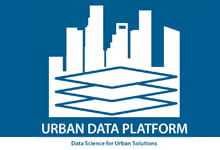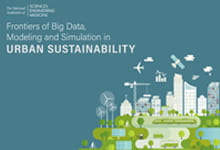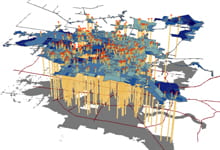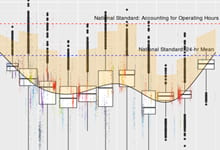Research and Programs
Dr. Katherine Ensor works on the theoretical and computational development of statistical methods for practical problems. Her primary emphasis is the analysis of dependent data as it relates to financial statistics, environmental statistics and urban analytics. Each of these areas are expanded below. She has also done significant work in the area of simulation based estimation for stochastic processes.
Research areas include: Time series including categorical time series, spatial statistics, spatial-temporal methods, stochastic simulation, hierarchical modeling and information integration, stochastic process modeling and estimation. Application areas include financial modeling, risk management, environmental statistics and urban analytics.
CURRENT EDITORIAL APPOINTMENTS
Editor, Applied Stochastic Models in Business and Industry
Acquisition Editor, WIRES Computational Statistics
COMPUTATIONAL FINANCE:
 In 2002, Ensor helped found the Center for Computational Finance and Economic Systems (CoFES) at Rice University. CoFES has had many successes since these early years. The Center maintains a curriculum open to all quantitative students interested in finance, and works with leaders in finance from Rice, in the Business School and the Economics Department, to broaden access to resources for research in this critical area of inquiry. CoFES in collaboration with Statistics and Economics supports the undergraduate Financial Computation and Modeling (FCAM) minor.
In 2002, Ensor helped found the Center for Computational Finance and Economic Systems (CoFES) at Rice University. CoFES has had many successes since these early years. The Center maintains a curriculum open to all quantitative students interested in finance, and works with leaders in finance from Rice, in the Business School and the Economics Department, to broaden access to resources for research in this critical area of inquiry. CoFES in collaboration with Statistics and Economics supports the undergraduate Financial Computation and Modeling (FCAM) minor.
Some exciting recent news and upcoming events include:
- September 4, 2020: The 9th Eubank Conference on Real World Markets: Sports Analytics and Gaming Risk Management. The annual conference choses a different quantitative finance theme each year.
- This spring CoFES launched a new course on BLOCKCHAIN (STAT 499/699) which will be offered again in the fall of 2020. It has been exciting to learn from the experts, about this revolutionary technology and the impact it will have on financial markets.
- Each semester we host a 1-credit course discussing quantitative finance. This class brings together an exciting group of students. This fall, Michael Jackson, a senior Ph.D. student in statistics, working with Ensor, is leading the discussion, and doing an exceptional job.
- Two CoFES students won ASA Paper Awards for JSM 2020.
- Michael Weylandt, B&E Section First Place, for his paper Multivariate Modeling of Natural Gas Spot Trading Hubs Incorporating Futures Market Realized Volatility. Michael is the lead author, with a previous CoFES+STAT Ph.D. alum, Yu Han as second author, and Ensor as third.
- Carly Fagnant, Risk Management Second Place, for her paper Characterizing spatio-temporal trends in extreme precipitation in Southeast Texas. Carly is lead author with our environmental engineering colleagues and Ensor is senior author.
URBAN ANALYTICS:
In her ASA Presidential Candidacy Statement, Ensor discussed the important role of Urban Analytics. Her interest and commitment to this area grew out of her environmental and health based research. But it is much bigger than this focus.
 Kinder UDP: For the last three years Ensor has lead the development of a data repository and secure computing environment, namely the Kinder Urban Data Platform, created to support research advancing the greater Houston region. Data published to this site becomes part of the permanent data history of Houston, with each data set receiving a d.o.i. It has proven significantly beneficial to Houston’s success, and brings national and international research attention to the Houston region.
Kinder UDP: For the last three years Ensor has lead the development of a data repository and secure computing environment, namely the Kinder Urban Data Platform, created to support research advancing the greater Houston region. Data published to this site becomes part of the permanent data history of Houston, with each data set receiving a d.o.i. It has proven significantly beneficial to Houston’s success, and brings national and international research attention to the Houston region.
 NASEM: In 2019, Ensor co-lead a workshop on Big Data, Models and Simulation for Sustainable Cities for the National Academies of Science, Engineering and Medicine. The highly successful workshop was followed by an equally successful webinar series held over the October, 2019 on the same topic. Key statistical issues in small area spatial estimation, data privacy, quality and availability and the rising role of urban analytics were featured in both series. For more information on the NASEM effort, check out the recordings and proceedings.
NASEM: In 2019, Ensor co-lead a workshop on Big Data, Models and Simulation for Sustainable Cities for the National Academies of Science, Engineering and Medicine. The highly successful workshop was followed by an equally successful webinar series held over the October, 2019 on the same topic. Key statistical issues in small area spatial estimation, data privacy, quality and availability and the rising role of urban analytics were featured in both series. For more information on the NASEM effort, check out the recordings and proceedings.
 Data Privacy: In January 2010, The Kinder UDP in collaboration with the Kinder Institute and the Ken Kennedy Institute hosted a power-packed one-day Symposium on Data Privacy. Speakers provided a platform for stimulating discussion on the current practice, challenges and research in data privacy and protection in a world where digital information impacts every aspect of our lives. Issues include computational and statistical technologies being developed to secure our digital footprint, policy changes around data privacy and the ethics of using data. Keynotes were given by Deborah Frincke, director of research for the National Security Agency, and Simson Garfinkel, leading computer scientist on data privacy at the U.S. Census Bureau.
Data Privacy: In January 2010, The Kinder UDP in collaboration with the Kinder Institute and the Ken Kennedy Institute hosted a power-packed one-day Symposium on Data Privacy. Speakers provided a platform for stimulating discussion on the current practice, challenges and research in data privacy and protection in a world where digital information impacts every aspect of our lives. Issues include computational and statistical technologies being developed to secure our digital footprint, policy changes around data privacy and the ethics of using data. Keynotes were given by Deborah Frincke, director of research for the National Security Agency, and Simson Garfinkel, leading computer scientist on data privacy at the U.S. Census Bureau.
STATISTICS AND THE ENVIRONMENT:
Urban analytics requires the best of our statistical thinking coupled with a willingness to engage local governments, NGOs, and communities to improve our quality of life.
 Ensor collaborates with cross-disciplinary groups of educators, researchers, city and public health professionals to pinpoint, monitor, and predict public health risks from exposure to environmental contaminants. This has included rigorous quantitative assessments of air quality for improved asthma management, identification of risk for cardiac arrest, and exposure to lead poisoning and cancer-causing substances in the environment. Much of this research is with collaborator Dr. Loren Hopkins and the Kinder Institute for Urban Research, Urban Health Program.
Ensor collaborates with cross-disciplinary groups of educators, researchers, city and public health professionals to pinpoint, monitor, and predict public health risks from exposure to environmental contaminants. This has included rigorous quantitative assessments of air quality for improved asthma management, identification of risk for cardiac arrest, and exposure to lead poisoning and cancer-causing substances in the environment. Much of this research is with collaborator Dr. Loren Hopkins and the Kinder Institute for Urban Research, Urban Health Program.
 Summer of 2019, Kathy depoloyed her FIRST SHINY APP(!!). The project was to create a system for real-time monitoring of permitted locations in Houston based on data obtained from monitors placed on the city fleet of vehicles. As the cars naturally pass by the site, the tool grows in its scientific message. This work was in collaboration with the City of Houston Health Department and Environmental Defense Fund. It was a fun July 4th spent prototyping the application and then turning it over to a fantastic team to polish. The app is available at https://kinderudp.shinyapps.io/app_02062020/. I would also like to note, that my admiration for the RStudio team, grows with every solution we build! A heartfelt thank you!!
Summer of 2019, Kathy depoloyed her FIRST SHINY APP(!!). The project was to create a system for real-time monitoring of permitted locations in Houston based on data obtained from monitors placed on the city fleet of vehicles. As the cars naturally pass by the site, the tool grows in its scientific message. This work was in collaboration with the City of Houston Health Department and Environmental Defense Fund. It was a fun July 4th spent prototyping the application and then turning it over to a fantastic team to polish. The app is available at https://kinderudp.shinyapps.io/app_02062020/. I would also like to note, that my admiration for the RStudio team, grows with every solution we build! A heartfelt thank you!!
CURRENT/RECENT FUNDED RESEARCH and INFRASTRUCTURE PROJECTS
- Eubank Endowment for the Center for Computational Finance and Economic Systems (ongoing)
- Brown Foundation Grant (2010-2020, PI). Graduate student support for CoFES.
- Rice Creative Ventures Fund (2020). Funding to support the annual NSF/NBER Time Series Conference to be held September, 2020.
- Houston Health Department (2020) Real-Time Benzene Mapping and Decision Support During Environmental Events
- Houston Solutions Lab (2019-2020) Real-Time Benzene Mapping and Decision Support During Environmental Events
- Houston Endowment (2020-2022) (Co-PI) Kinder Institute Urban Data Platform
- Environmental Defense Fund (2019) ($60K). Site Analytics and Quality Control Based from Hyperlocal Air Quality Measurements
- Rice Creative Ventures Fund (2019) Funding to support conference on Data Privacy
- Environmental Defense Fund (2018) ($35K). Assessing Air Quality from Monitors Placed on City Cars.
- NIH (2018-2020) (Co-PI $430,375) Time Sensitive Award Mechanism – Using Exposure Science to Identify Populations at Risk in the Aftermath of Hurricane Harvey. Created the Texas Flood Registry.
- NIH 17-0661 (PRIME). (2017-2022) (Co-PI $2,713,280). Assessing the Impact of Multiple Environmental Social Stressors on Early Childhood Educational Outcomes.
- Houston Endowment (2016-2019) ($7Millon – collaborative; $2.2Million Ensor) – Kinder Institute for Urban Data Platform

